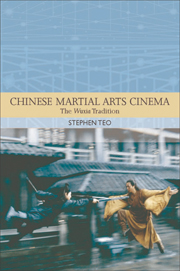Book contents
- Frontmatter
- Contents
- TRADITIONS IN WORLD CINEMA
- Acknowledgements
- Dedication
- Introduction
- 1 Wuxia from Literature to Cinema
- 2 Reactions against the Wuxia Genre
- 3 The Rise of Kung Fu, from Wong Fei-hung to Bruce Lee
- 4 The Rise of New School Wuxia
- 5 The Wuxia Films of King Hu
- 6 Wuxia after A Touch of Zen
- 7 Wuxia between Nationalism and Transnationalism
- Epilogue
- Glossary
- Bibliography
- Filmography
- Index
7 - Wuxia between Nationalism and Transnationalism
Published online by Cambridge University Press: 05 August 2013
- Frontmatter
- Contents
- TRADITIONS IN WORLD CINEMA
- Acknowledgements
- Dedication
- Introduction
- 1 Wuxia from Literature to Cinema
- 2 Reactions against the Wuxia Genre
- 3 The Rise of Kung Fu, from Wong Fei-hung to Bruce Lee
- 4 The Rise of New School Wuxia
- 5 The Wuxia Films of King Hu
- 6 Wuxia after A Touch of Zen
- 7 Wuxia between Nationalism and Transnationalism
- Epilogue
- Glossary
- Bibliography
- Filmography
- Index
Summary
We now reach the concluding chapter of this monograph to examine the status and nature of the wuxia genre in its present development. In the new millennium, we see the genre's tendency to manifest as made-in-China historicist blockbusters mixing the epic form with wuxia. Examples are Tsui Hark's Legend of Zu (2001), Qi jian (Seven Swords, 2005), Zhang Yimou's Hero (2002), House of Flying Daggers (2004), Curse of the Golden Flower (2006), He Ping's Tiandi yingxiong (Warriors of Heaven and Earth, 2004), Chen Kaige's Wuji (The Promise, 2005), Feng Xiaogang's Yeyan (The Banquet, 2006), Jacob Cheung's A Battle of Wits (2006), Peter Chan's The Warlords (2007), Ching Siu-tung's Jiangshan meiren (An Empress and the Warriors, 2008), and John Woo's Chibi (Red Cliff, first instalment 2008, second instalment upcoming at the time of writing).
Having been grafted onto the period epic, wuxia becomes a showcase of Chinese history, seeking to be universally accepted while at the same time locating itself within the historicist confines of the nation-state. In this chapter, I examine how wuxia in the new millennium shifts back and forth between two currents, nationalism and transnationalism, and in the process, question how the genre's characteristics and themes are refashioned or remain the same. The film that initiated the whole process was Crouching Tiger, Hidden Dragon, released in 2000, and which became the first Chinese film to score a huge success at the box-office in the West.
- Type
- Chapter
- Information
- Chinese Martial Arts CinemaThe Wuxia Tradition, pp. 172 - 195Publisher: Edinburgh University PressPrint publication year: 2009



